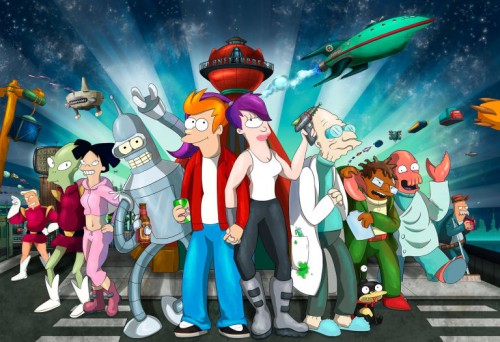We’ve all heard the saying, “you eat with your eyes first.” Quoted by chefs, event planners, and entertaining experts, these few words translated from a Chinese proverb have the power to provide, in eloquently simple terms, the most basic of culinary statements: Presentation matters.
This proverb deserves to be more than just an overused quotation, however. It deserves to be explained.
The full proverb reads, “You eat first with your eyes, then your nose, then your mouth.” While leaving out the last two parts of the sentence will get the point across, it is important we understand and then share the three steps that contribute to fully enjoying a superb dish.
As we first set our eyes upon a stunning dish, something stirs within us. The colors and positioning of each element coupled with the textures and tones of each ingredient combine to create something that makes us gaze in admiration. This, to me, represents the first step toward creating a successful dish. I call this step “The Promise.” It is the chef’s promise that what sits before each guest will dazzle their taste buds and forever be remembered.
Of course, a promise is only good when delivered upon. I have seen chefs who focus so much on the presentation that they lose sight of everything else. Delivering a dish that tastes even better than it looks is the ultimate end goal. If the flavors don’t live up to the presentation, we have certainly failed.
Event Fundamentals
As with anything in the food business we must first consider the challenges and reality of our circumstances before setting out to design the perfect dish. Forgoing this step will most likely result in failure.
How a restaurant might plate each course à la minute is very different than how a caterer will push out 50, 500, or 5,000 of the same meal. While each has its limitations, each also has its advantages.
In a restaurant environment we can never know what each patron may order, so planning in advance is a bit of a guessing game (to say the least). Conversely, a restaurant chef will generally have more time to plate each dish. This allows the ability to fine tune a small detail, add complexity, or vary how each dish is plated.
In catering we know exactly (or almost exactly) what we will be serving well in advance, but will not necessarily have the luxury of spending several minutes on each plate before it leaves the kitchen. Instead we have between 10 and 30 minutes to serve all the meals for a specific course, depending on the size of the group and complexity of the dish.
For catered events at Eatertainment, we work through the fundamentals of the event to ensure the final product matches the test version we presented in our original tasting. Some of these elements include:
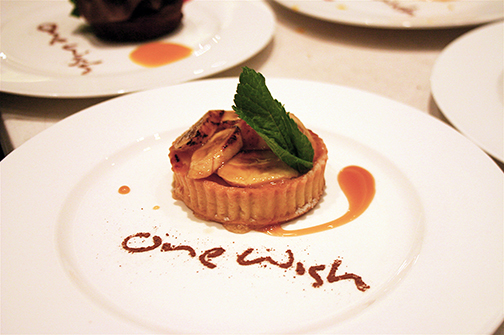
The logo on this plate was made with a clear die-cut acetate film (not all logos work for this), then the use of either colored icing sugar lightly sprinkled over the template, or icing gel skimmed onto the plate over the template.
Guest count and the Space We Have to Work In
In the case of our logo plate, for example, we require a great amount of advance work to logo each plate long before the dish is served. Having access to large spaces, jack stands, and/or plenty of tabletop space for storage of the finished plate allows us to make this work. If the product requires refrigeration the jack stands become imperative.
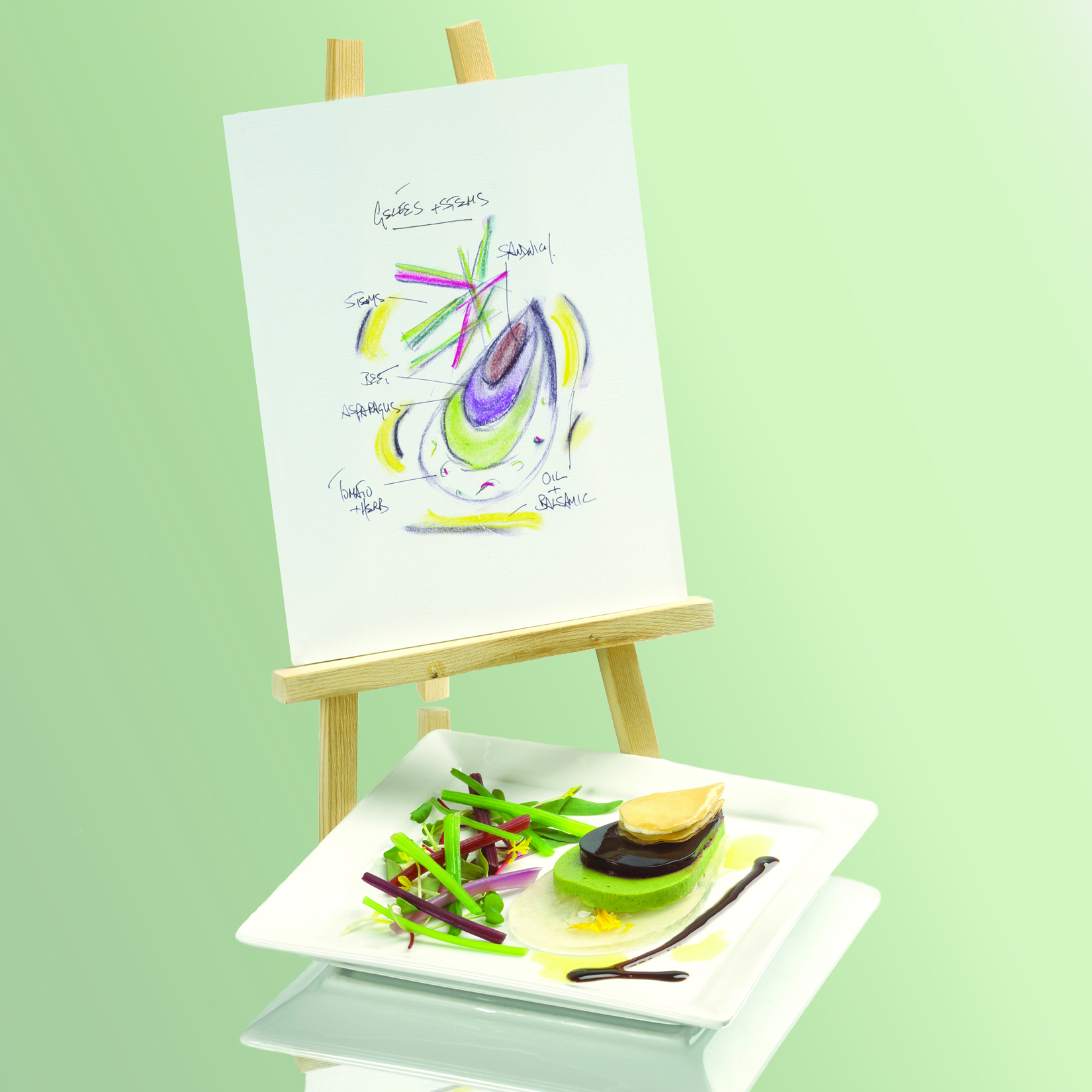
Adding original art on mini easels is unique and enjoyable but requires additional budget, of course.
Client Budget
We like to believe we can make anything work for almost any budget, but the reality is that creating something truly unique requires financial investment. Take for example our ‘art imitates life’ dinner series. We designed a dish that was first conceptually sketched, but then the actual sketch was re-done with pastels and presented on an easel over the dish. Guests were allowed to keep the sketch and easel, but bottom line: in addition to the food cost, our client had to invest in a sketch printed on museum quality parchment, a purchased easel, and the extra time it took to plan and execute the dish.
We also took this same concept to another level with mini-easels on which we placed a photographic image printed with edible ink on rice paper. The dish was a hot consommé and guests were asked to drop the rice paper into the soup. As the paper touched the hot liquid it simply dissolved into the broth. Striking yes, but thanks to a lot of advance work (and budget) the execution was almost as simple as serving a plain soup.
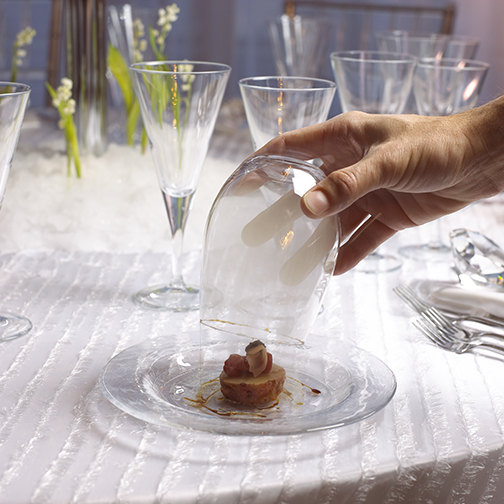
Green tea smoked beef served room temperature made plating a breeze.
Listen to your Team
I love the people I work with. They are creative, hardworking, passionate, and almost as obsessed with food as I am. They are also often the voice of reason, as my ideas can sometimes take on lives of their own. Many times as my Executive Chef, Chris, and I are brainstorming a dish, he will develop a slight grin followed by an “OK—let’s just hold on a second…” followed then by a very good explanation as to why what I just described cannot be done with the limitations we have. Most times he is right, but through this process we typically find some hybrid version of the original idea that can be executed.
Here’s an example: I wanted to incorporate an odor of green tea smoke into our beef starter. We played with it forever and each time we couldn’t figure out how to serve it quickly enough to keep the beef warm while also getting the smoke just right. Finally one of our junior chefs asked, “Why do we have to serve it warm?” He was right.
We adjusted the dish to be a cured beef tenderloin served room temperature with pickled ginger and wasabi caviar—which then also meant we could pre-plate almost 400 servings. As the plates came out of the fridge, we set up a line where the only step required was to capture smoke in a stemless glass and drop it over the beef. Voila!… problem solved.
Use Three Tools
I like to do things right, but sometimes limitations make a dish impossible to execute. In this case, all is not lost; I just rely on three easy “tools” to ensure every dish we plate is a feast for the eyes before it is a feast for the palate.
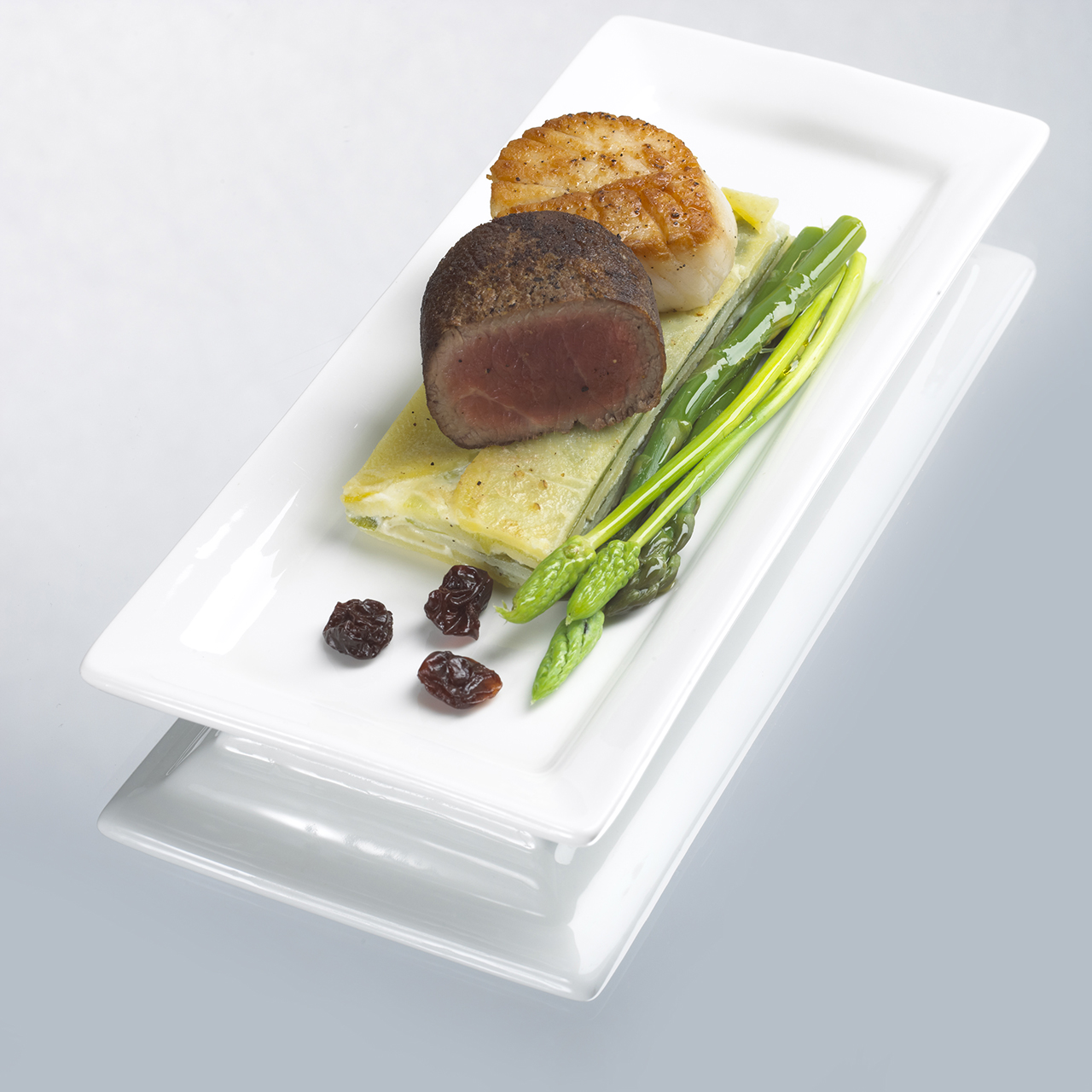
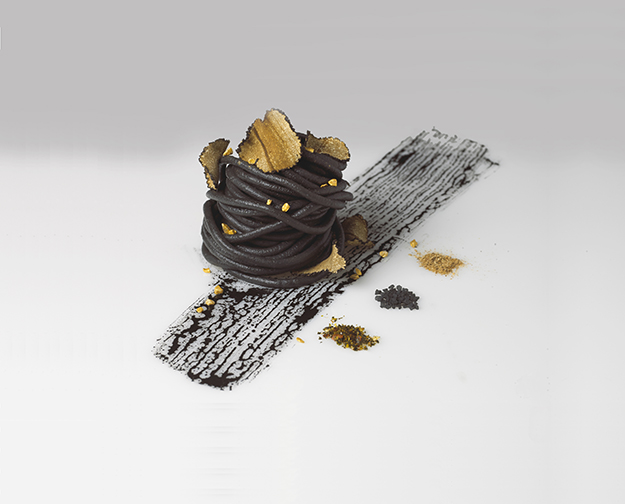
Color
Consider the colors of each element you want to plate. With the abundance of local to international products available, there really is no reason you can’t incorporate a variety of color into your dishes. Our seared scallop and beef tenderloin duo with potato leek dauphinoise and two types of asparagus show this perfectly. Simply picking ingredients which pop in color will make a huge difference in how your plate looks. Alternately, sometimes limiting the color can have a huge impact as well. Our squid ink pasta dish features only two colors; black and brown, but when presented on a stark white plate the dish takes on an almost surreal appearance.
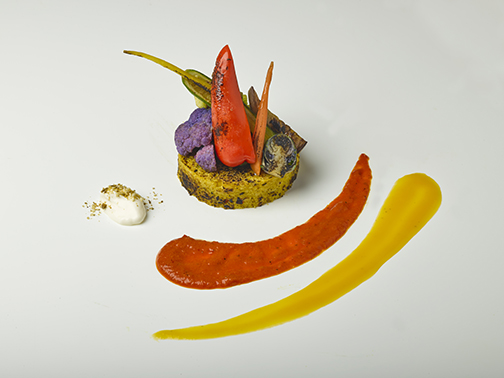
Positioning
I am huge fan of geometric patterns. Circles, squares, and even streams fascinate me. The ability to place ingredients on a plate in a manner that replicates a work of art takes a lot of practice. We sometimes re-plate a dish a few dozen times before we get it just right. As with our fall colors vegetarian stack (shown) you can see how the placement and shape of each ingredient is crucial to the overall look.
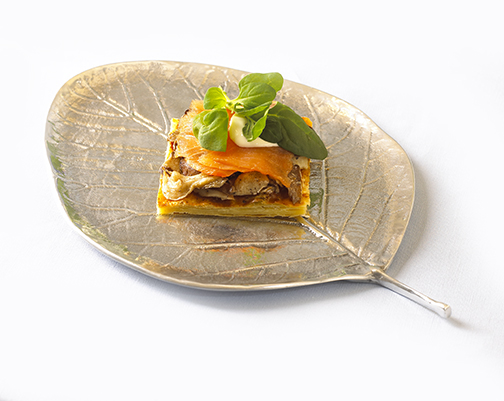
Smoked salmon and field mushroom appetizer where the plate itself is as spectacular as the dish
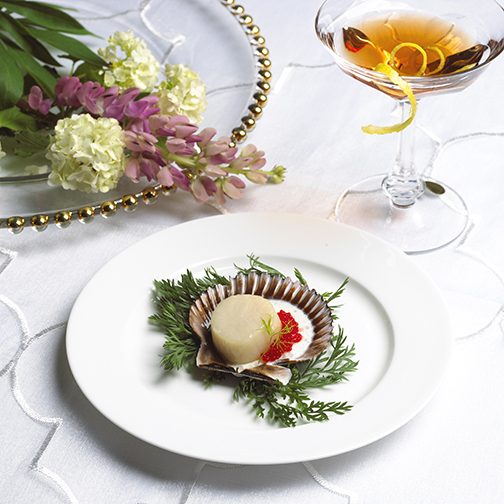
Scallop appetizer served on an actual shell
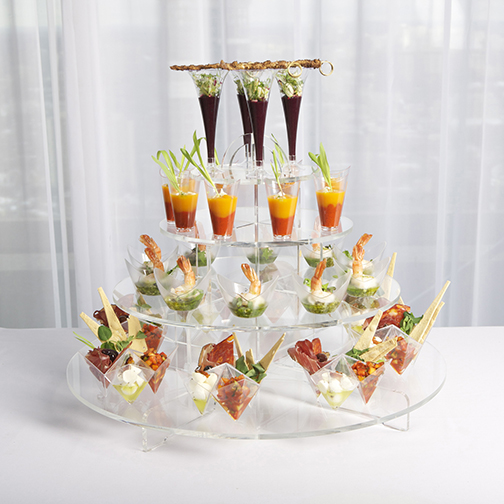
Antipasto tower where each vessel is itself a mini-meal
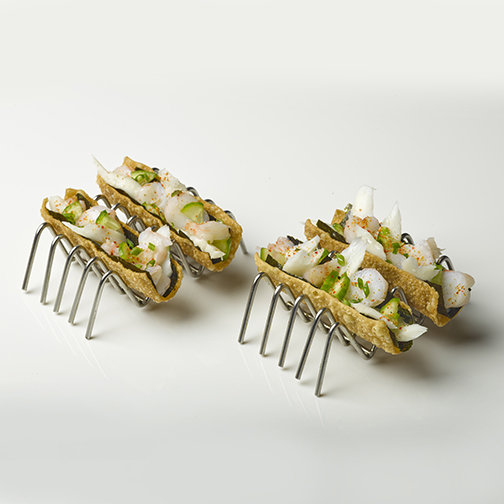
Lobster ceviche taccones placed in fun little racks
Rentals
We are lucky that rental companies have really upped their game and are now stocking more unique service pieces that can be incorporated into a presentation. This can apply to plated courses as well as towers and racks.
Each dish we send out of our kitchen represents our passion for this business, and should reflect that. Amaze people with the first impression your dish commands, then wow them with the follow-up scents and flavors. That is quite simply the formula for creating a memorable dish.
And don’t forget to have some fun along the way. We are the lucky ones, we get to play with our food… and we get paid to do something we love!
Sebastien Centner is the Director of Eatertainment Hospitality & Eatertainment Special Events & Catering, Toronto, ON, Canada. His Twitter handle is @sebcentner.



